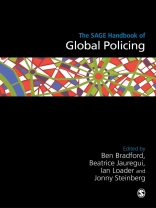The SAGE Handbook of Global Policing examines and critically retraces the field of policing studies by posing and exploring a series of fundamental questions to do with the concept and institutions of policing and their relation to social and political life in today′s globalized world. The volume is structured in the following four parts:
- Part One: Lenses
- Part Two: Social and Political Order
- Part Three: Legacies
- Part Four: Problems and Problematics.
By bringing new lines of vision and new voices to the social analysis of policing, and by clearly demonstrating why policing matters, the Handbook will be an essential tool for anyone in the field.
สารบัญ
01. Global Policing Studies: A Prospective Field – Ian Loader, Ben Bradford, Beatrice Jauregui and Jonny Steinberg
PART I: LENSES
02. Political Theory, Institutional Purpose and Policing – Seumas Miller
03. Disentangling the ‘Golden Threads’: Policing the Lessons from Police History – Georgina Sinclair
04. Beyond the Social Control of Space: Towards a Multidimensional Approach to Local Security Networks – Mariana Valverde
05. The Color of Safety: The Psychology of Race and Policing – Rick Trinkner and Phillip Atiba Goff
06. Police, the Rule of Law and Civil Society: A Philosophical Perspective – Jonathan Jacobs
07. The Anthropology of Police – Kevin G. Karpiak
08. Police Lawfulness and Public Security – Tracey L. Meares
09. Literature and Global Policing – James Purdon
PART II: SOCIAL AND POLITICAL ORDER
10. Police and State – Thomas Bierschenk
11. Global Policing and the Nation-State – Michael C. Williams
12. The Police and Inequality: Tales from Two Cities – Forrest Stuart and Steve Herbert
13. Policing Difference – Vanessa Barker
14. Policing and Human Rights – Benjamin J. Goold
15. Police, Crime and Order: The Case of Stop and Search – Ben Bradford and Ian Loader
16. War, Policing and Killing – Cécile Fabre
17. Freedom, Policing and Urban Liberalism – Christopher Lowen Agee
PART III: LEGACIES
18. Policing after Colonialism – Olly Owen
19. Policing after State Socialism – Andy Aitchison
20. Policing after Dictatorship in South America – Máximo Sozzo
21. Policing after the Revolution: The Emergence of Professional Police in New China – Fangquan Liu and Jeffrey T. Martin
22. Policing after Civil Rights: The Legacy of Police Opposition to the Civil Rights Movement for Contemporary American Policing – Jonathan Simon
PART IV: PROBLEMS AND PROBLEMATICS
23. Modernization and Development as a Motor of Polity and Policing – Catarina Frois and Helena Machado
24. New Animism in Policing: Re-animating the Rule of Law? – Mireille Hildebrandt
25. Countering Transnational Terrorism: Global Policing, Global Threats and Human Rights – David Cole
26. Police in Armed Conflict – Robert M. Perito
27. Local Dynamics of a Global Phenomenon: Policing Organized Crime – Rolando Ochoa
28. Police, ‘Police’ and the Urban – Graham Denyer Willis
29. Global Policing and Mobility: Identity, Territory, Sovereignty – Helene O. I. Gundhus and Katja Franko
30. Towards a Global Control? Policing and Protest in a New Century – Kivanç Atak and Donatella della Porta
31. The Market for Global Policing – Adam White
32. Policing and New Environmental Governance – Cameron Holley and Clifford Shearing
33. Policing by and for Women in Brazil and Beyond – Sarah Hautzinger
34. Complex Needs in Policing: Training, Responsibility and Contestation in Late Neoliberalism – Michelle Stewart
เกี่ยวกับผู้แต่ง
Jonny Steinberg teaches African Studies at Oxford University and is a visiting professor at the Wits Institute for Social and Economic Research (Wiser) in Johannesburg. Among his books are The Number (2004), a social history of a South African prison, and Thin Blue (2008) an exploration of the relationship between uniformed police and civilians in the wake of apartheid. Steinberg was an inaugural winner of the Windham-Campbell Prizes for Literature awarded by Yale University and has twice won South Africa′s highest literary prize, the Sunday Times Alan Paton Award. He is the author of numerous articles on South African policing published in the British Journal of Criminology, Theoretical Criminology, Policing and Society, African Affairs and Public Culture.












